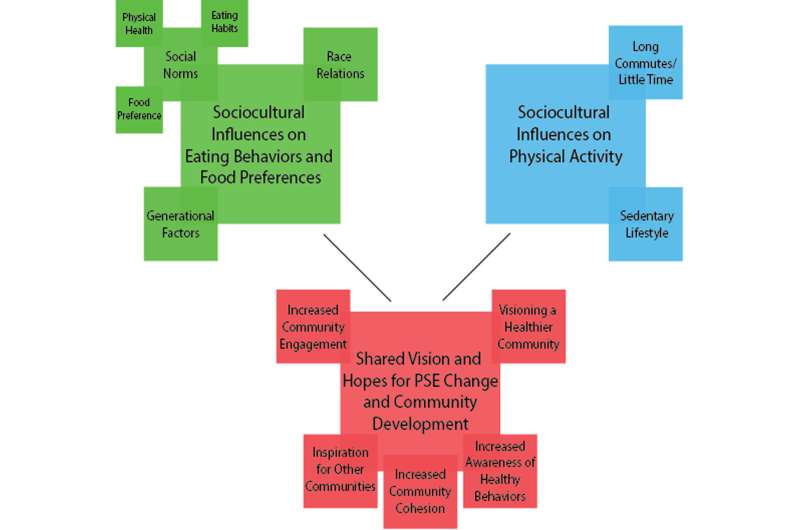Sociocultural influences on food and physical activity on communities’ shared vision for policies, systems, and environments change. Credit: Journal of Nutrition Education and Behavior (2023). DOI: 10.1016/j.jneb.2022.10.011
The prevalence of obesity in rural communities goes beyond food choice and geography to include issues such as class, culture and identity; however, these issues are often not taken into account in policy, systems and environmental (PSE) change programs developed for community members.
A study in the Journal of Nutrition Education and Behavior explores the influence of factors beyond food and fitness, such as race relations, generational influences, physical activity social norms, and shared community goals with regard to PSE initiatives.
"Culture is a really big part of history and history is a really big part of rural communities. So, we wanted to examine the relationship between lack of access from the built environment as well as how culture and cultural identity interact," says corresponding author Catherine E. Sanders, Ph.D., currently Assistant Professor and Extension Specialist of Food Systems Communication at North Carolina State University.
"Cultural differences and expectations, including norms around physical activity and body size, may influence obesity prevalence and effectiveness of programs implemented by health professionals."
The research was conducted by Dr. Sanders during her doctoral program at the University of Georgia in the Department of Agricultural Leadership, Education and Communication along with co-investigators Alexa Lamm, Ph.D., Alison Berg, Ph.D., RDN, LD, and Nekeisha Randall, MAL.
Corresponding author Catherine E. Sanders, PhD, discusses the results of CDC's High Obesity Program implemented in five rural southern counties by the University of Georgia. Researchers identify the challenges of and solutions for addressing healthy eating and physical activity practices in communities where those practices counter cultural norms. Credit: Journal of Nutrition Education and Behavior
Researchers looked at data from a Centers for Disease Control and Prevention (CDC) project, Healthier Together, where university and coalition members created shared-use community gardens, work with food pantries for greater access to healthy food options, install grab and go coolers, and build walking trails to encourage physical activity.
The project was the result of a partnership between the University of Georgia Colleges of Public Health, Agricultural and Environmental Sciences, Family and Consumer Sciences, and Environment and Design as well as UGA Extension. This PSE project was started in 2018 in five rural counties in Georgia where adult obesity prevalence exceeds 40%. The research team interviewed 39 community coalition members who were instrumental in implementing the project in these counties.
Key themes emerging from the study include:
- The challenge of addressing healthy eating and physical activity practices in communities where those practices counter cultural norms.
- The impact of food availability on communities where grocery stores with less healthy but more affordable options are prevalent.
- The importance of relationship building in collective action. Participants cited improvements in community cohesion and shared goals from those of different backgrounds and cultures through their involvement in the Healthier Together project.
"Overall, community coalition members just wanted people to see value in the change initiative. They wanted to lower obesity rates, but some of the interesting findings related to culture included the slowness of change and how rural communities should help us qualify successes. They recognized you're not going to come in and have change overnight because of community traditions," states Sanders.
"Knowing the strong influence that culture has on food choice and physical activity, health practitioners should be encouraged to create interventions in alignment with the cultural norms of the communities they serve. Working with this in mind will help create more effective and sustainable programs with long-term success."
More information: Nekeisha L. Randall et al, Qualitative Exploration of Cultural Influence on a Rural Health-Promotion Initiative, Journal of Nutrition Education and Behavior (2023). DOI: 10.1016/j.jneb.2022.10.011
Journal information: Journal of Nutrition Education and Behavior
Provided by Elsevier
























